The general election in Bangladesh on January 5 may have triggered a wave of problems for India.
The return of the Awami League (AL) to power in an election that was widely regarded as lacking credibility is being challenged on the streets through mass protests, strikes and shutdowns. While turmoil is not new to Bangladesh, its likely escalation in the coming months will give a fillip to anti-India forces. This has implications for India’s security and the situation in its restive Northeast.
Had the AL returned to power in an inclusive, credible election, India could have let out a sigh of relief, given the traditionally good ties it has had with the AL. Relations between the two countries were good during the AL’s last term (2009-2014). Its government was seen to have addressed several issues of concern to India. For example, Prime Minister Sheikh Hasina cracked down on anti-India insurgent groups that were operating from Bangladesh; it also took steps to improve regional connectivity. Another term in office for the AL could have consolidated these gains.
However, the AL’s victory came in an election that was boycotted by a large number of parties, including the Bangladesh Nationalist Party (BNP). As a result of the opposition boycott, about half the seats were uncontested, allowing the AL to secure 127 seats even before the first vote was cast. The AL was challenged in 147 constituencies, but mostly by minor parties, independents and rebel Awami Leaguers.
In the run-up to the elections, India did try to persuade the BNP and others to enter the electoral fray. It did not succeed, and then backed the AL’s decision to hold elections in spite of the boycott.
India bought the AL’s argument that the BNP and its boycott call enjoyed little support in Bangladesh, and that an election would see a big turnout, observes Imtiaz Ahmed, professor of International Relations at the University of Dhaka, during an interview on the telephone. India, he adds, “listened only to what the AL said, paying no heed to the views of others parties, or even those of civil society.”
New Delhi woke up to the reality on January 5. Voter turnout that day was dismal; just 20-30% of voters, perhaps less, showed up. It was not just BNP supporters who did not vote. Many who have traditionally backed the AL stayed away too. And it wasn’t fear of violence that kept the voters away. Dhaka was peaceful, yet turnout was low.
After the election, India issued a statement describing the election as a “constitutional requirement.” Technically, it was correct. However, its silence on the low participation and voter turnout has angered Bangladeshis. Many are now pointing to “a so-called ‘Indian hand’ behind the formation of a ‘One Party State’ through this farcical election,” says Shafquat Rabbee, a Bangladeshi-American writer with close ties to the BNP, in an email interview.
If India’s decision to back the January 5 elections was aimed at keeping at bay anti-India forces in Bangladesh, it has failed. Anti-India sentiment in Bangladesh today is high. India’s near-silence over the AL’s return to power in a questionable election has boosted the very forces it was hoping would be weakened, points out Ahmed.
In the coming weeks a shaky AL government could use force to quell the mounting protests. It could even declare a state of emergency. There is the possibility too of the military stepping in, although it appears disinclined to do so at the moment.
Either of these options would deal a severe blow to Bangladesh’s already ailing democracy. And India will be seen as having facilitated this.
However, it is apprehension over the BNP’s alliance with the Islamist and pro-Pakistan Jamaat-e-Islami that has driven India to lean towards the AL. But this is “not prudent policy,” Rabbee observes. The BNP’s ties with the Jamaat are “likely to be strong for a while” as both are “facing the threat of elimination by a common opponent [the AL],” Rabbee points out. But “it is not a permanent alliance,” as BNP leader Khaleda Zia said in a recent New York Times interview.
Should it come to power in fresh elections, the BNP is likely to pursue “a pro-business foreign policy,” Rabbee says, “where Bangladesh maintains strong ties with its neighbours on mutually beneficial terms.”
Ahmed dismisses India’s apprehensions that a BNP government will pursue an anti-India policy, stressing that “no political party in Bangladesh can afford to do so.” The two economies are tied up together; 20% of cotton for Bangladesh’s garment industry comes from India, according to Ahmed. “Globalisation has changed the India-Bangladesh dynamic,” he says
Despite its near-silence, there are signs that India is not happy with the way the election turned out. This was evident in the statement India issued after the election, which was “not congratulatory,” Ahmed observes. Now, India must tell the AL government to initiate a dialogue and announce a date for fresh elections, he says. And it must do so immediately. The more it delays, the more anti-India sentiment will surge in Bangladesh.
Fresh elections may throw up a result that New Delhi is not comfortable with. Still, a credible election that has legitimacy in the eyes of the people is important for political stability in Bangladesh, as well as for India’s interests and standing in that country.
Sudha Ramachandran is an independent analyst based in Bangalore. She writes on South Asian politics and security issues.
This article was exclusively written for Gateway House: Indian Council on Global Relations. You can read more exclusive content here.
For interview requests with the author, or for permission to republish, please contact outreach@gatewayhouse.in.
© Copyright 2014 Gateway House: Indian Council on Global Relations. All rights reserved. Any unauthorized copying or reproduction is strictly prohibited


